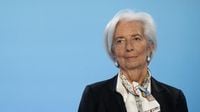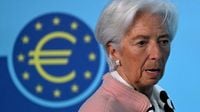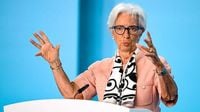On April 17, 2025, Christine Lagarde, President of the European Central Bank (ECB), addressed the media and analysts, likely with a U.S. audience in mind, greeting them with a cheery "Good Morning" instead of the usual "Good Afternoon." This unusual greeting hinted at the importance of the day’s discussions, which revolved around the ECB's recent decision to cut interest rates by 25 basis points to 2.25 percent.
However, the focus of Lagarde's address was not solely on the ECB's monetary policy but also on the significant economic developments in the United States. Just the day before, Jerome Powell, the U.S. Federal Reserve Chairman, had made headlines by openly opposing President Donald Trump's demands for swift interest rate cuts. Powell emphasized the need for the Fed to maintain steady rates due to the uncertainties stemming from tariffs imposed by Trump, stating, "we need to wait for greater clarity."
Trump, facing mounting pressure, reacted swiftly to Powell's comments, calling for immediate rate cuts and suggesting that Powell's term as Fed Chair should end sooner rather than later. This public dispute raised concerns among economists, who warned that such actions could lead to chaos in the markets and an increase in inflation. Olivier Blanchard, former chief economist at the International Monetary Fund (IMF), remarked on social media, "Once again, President Trump is playing with fire."
In her remarks, Lagarde did not directly address Trump or his comments but underscored the importance of central bank independence, expressing her respect for Powell. She stated, "The independence of central banks is fundamental," reinforcing the ECB's commitment to its role in maintaining economic stability.
Lagarde's comments came amid what she described as a "large escalation" in the global trade conflict, which she acknowledged had a negative impact on economic growth. She noted that the erratic U.S. tariff policy was likely to influence growth, stating, "We can assume that it will have some effect on growth." Yet, she cautioned that the actual impact on inflation would take time to manifest.
The ECB's decision to lower rates for the seventh time since the summer of 2024 was unanimous, reflecting a collective acknowledgment of the challenging economic landscape. Lagarde indicated that, just weeks prior, some members of the ECB Council had considered pausing further rate cuts, but the recent developments necessitated action.
Looking ahead, Lagarde emphasized the need for Europe to enhance its competitiveness. She urged EU member states to take decisive steps to foster a more competitive environment, stating, "This is a moment for Europe and Europeans to focus on the opportunities." She also hinted at the importance of moving forward with the legislative framework for the introduction of a digital euro, indicating that the ECB is prepared for this transition.
As the ECB prepares for its next Council meeting on June 5, 2025, new forecasts for growth and inflation will be presented. Mark Wall, the chief economist for Deutsche Bank in Europe, anticipates further interest rate cuts, potentially lowering rates to 1.5 percent by the end of the year. He noted, "The characterization of exceptional uncertainty implies an openness to further monetary easing, provided the trade shock persists and is confirmed by the data."
Lagarde reported that the inflation rate in March was 2.2 percent, and the ECB aims for an average consumer price increase of 2.0 percent, which aligns with its mandate of price stability. However, she acknowledged that the outlook is clouded by the uncertainties stemming from U.S. policies.
Analysts have expressed concerns about the implications of the ongoing trade tensions on inflation. Lagarde pointed out that while U.S. tariffs could have disinflationary effects by redirecting certain goods to Europe, there are also inflationary pressures arising from the fragmentation of global supply chains, climate change, and increasing defense expenditures.
The recent appreciation of the euro to approximately 1.14 dollars was seen by Lagarde as a sign that investor confidence in the eurozone is currently stronger than in other economic regions. Commerzbank's chief economist, Jörg Krämer, suggested that the depth of future interest rate cuts will largely depend on U.S. tariff policies. He stated, "We still see two rate cuts to 1.75 percent in our base scenario. If Trump were to revert to reciprocal tariffs of 20 percent, a lower benchmark rate would likely be necessary."
The DZ Bank noted that the ongoing trade dispute compels the ECB to consider rapid further rate cuts, which could soon position the ECB's benchmark rate in a range that supports economic growth. In its statement regarding the rate decision, the ECB removed the word "restrictive," indicating a shift in its policy stance. Lagarde reflected on the historical context, recalling that three years prior, the military invasion of Ukraine by Russia had triggered an inflation shock in Europe, highlighting the ongoing challenges faced by the eurozone.
As the global economic landscape continues to evolve, the actions of central banks like the ECB and the Fed will be closely monitored. With uncertainties looming, Lagarde's call for readiness and agility underscores the need for proactive measures in navigating these turbulent waters.






